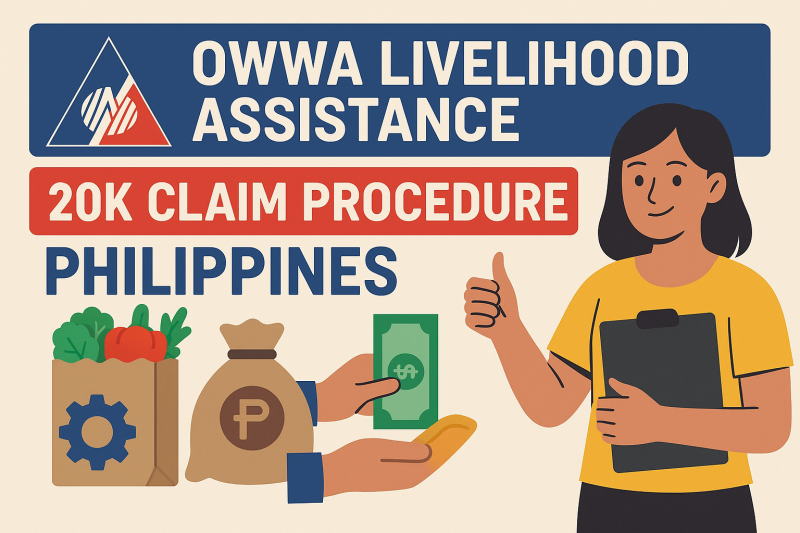OWWA Livelihood Assistance 20k Claim Procedure Philippines
The OWWA Balik Pinas Balik Hanapbuhay Program provides a ₱20,000 OWWA livelihood assistance package to help returning Overseas Filipino Workers (OFWs) start small businesses and regain financial stability. This guide outlines everything you need to know about the OFW livelihood grant—from eligibility and requirements to the step-by-step application process—so you can take full advantage of this reintegration program.
1. Legal and Policy Framework
The program is founded on the OWWA Act of 2016 and updated policy issuances that mandate the protection and reintegration of OFWs. Through the Balik Pinas Balik Hanapbuhay program, OWWA provides a non-loan, non-collateral, and tax-free cash grant worth ₱20,000 to qualified beneficiaries.
2. Purpose and Nature of the OWWA Livelihood Assistance
-
Objective: To provide start-up or additional capital for distressed, displaced, or repatriated OFWs so they can establish small livelihood projects.
-
Form: One-time cash grant of up to ₱20,000 per household.
-
Nature: Classified as a social welfare benefit, the OWWA livelihood assistance is not taxable and does not need to be repaid. Misuse of funds may result in sanctions and refund requirements.
3. Who Can Apply for the OWWA Livelihood Assistance 20k Claim Procedure Philippines
To qualify for this OWWA financial assistance, applicants must:
-
Be a repatriated or distressed OFW (due to maltreatment, unpaid wages, conflict, or similar issues) or terminated through no fault of their own.
-
Have an active OWWA membership at the time of repatriation or within the last three (3) years. Undocumented workers may update membership upon arrival.
-
Have returned to the Philippines for good with no pending overseas contracts.
-
Not have previously availed of the BPBH program.
-
Submit a business plan that passes OWWA’s evaluation.
Note: Dual citizens and permanent residents abroad are not eligible.
4. Required Documents for OWWA Livelihood Assistance
Applicants need to prepare the following:
-
Completed BPBH Application Form from OWWA.
-
Valid Passport (with arrival stamp) or Seaman’s Book.
-
Proof of active OWWA Membership.
-
Proof of repatriation (e.g., POLO/Embassy certification, airline ticket, and affidavit).
-
Two (2) recent 2×2 photos.
-
Barangay Certificate of Residency.
-
Simple Business Plan (template provided during training).
-
Signed undertaking for fund use and monitoring.
-
Optional but helpful: DTI Registration and BIR TIN for faster permit processing.
5. Step-by-Step Guide: How to Apply for OWWA Livelihood Assistance
-
Pre-Screening: Call OWWA Hotline 1348 for eligibility check and schedule.
-
Submit Documents: File requirements at the Regional Welfare Office (RWO).
-
Entrepreneurship Training: Attend a 1-day business training course.
-
Business Plan Evaluation: RWO and partners review the project for viability.
-
Approval & Undertaking: Sign the Deed of Release and Utilization Undertaking.
-
Fund Release: Receive the ₱20,000 grant via Land Bank, cash card, or check.
-
Post-Monitoring: OWWA conducts monitoring visits at the 6th and 12th month.
6. Eligible Projects Under the OWWA Livelihood Program
OWWA supports projects suited to the skills of returning OFWs, such as:
-
Trade & Services: Sari-sari store, auto repair, e-loading, printing.
-
Agriculture & Aquaculture: Hog or goat raising, tilapia ponds, mushroom farming.
-
Food Processing: Local delicacies, bottled sardines, homemade drinks.
-
Crafts & Manufacturing: Tailoring, bamboo furniture, handicrafts.
Projects must be practical and realistic. High-capital businesses are discouraged unless co-funded by LGUs or private groups.
7. Post-Grant Obligations of Beneficiaries
Beneficiaries of the Balik Pinas Balik Hanapbuhay program are required to:
-
Submit a Fund Utilization Report: At least 80% of the grant must go toward business expenses within 60 days.
-
Allow Monitoring Visits: OWWA staff will visit, take photos, and review records.
-
Comply with Rules: Non-compliance may lead to refund demands, suspension of other OWWA benefits, and disqualification from future grants.
8. Can OWWA Livelihood Assistance Be Combined with Other Programs?
-
Yes, with EDLP: The ₱20,000 may serve as equity for loans up to ₱2 million under the Enterprise Development & Loan Program.
-
No, with NRCO Livelihood Assistance: Beneficiaries must choose only one.
-
Yes, with LGU or DTI Programs: You may seek mentorship, permits, and additional support from Negosyo Centers.
9. Remedies if Your Application is Denied
-
File a Motion for Reconsideration within 15 days at the same RWO.
-
If denied again, appeal to the OWWA Central Office or DOLE Secretary.
-
Judicial review is allowed only after exhausting all administrative remedies.
10. FAQs on OWWA Financial Assistance for OFWs
-
Is the grant shared among co-owners? No, it’s released to a single beneficiary.
-
Does it affect SSS or PhilHealth contributions? No, it is not considered compensation.
-
Can a spouse claim it on behalf of an OFW abroad? Yes, with a Special Power of Attorney.
-
Can the government garnish the grant for debts? No, it is protected as a social welfare benefit.
11. Tips for a Successful Application
-
Make sure your OWWA membership is active before applying.
-
Choose a business idea that fits within the ₱20,000 budget.
-
Keep all receipts; if lost, prepare a notarized affidavit.
-
Cooperate during OWWA’s monitoring visits.
-
Double-check your personal details to avoid disbursement delays.
12. Conclusion
The OWWA Livelihood Assistance through the Balik Pinas Balik Hanapbuhay Program provides valuable support to returning OFWs who want to rebuild their lives through small businesses. By meeting the eligibility requirements, preparing complete documents, and complying with post-grant obligations, OFWs can maximize this livelihood grant and achieve long-term financial security for themselves and their families.
